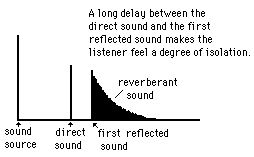
Perception of Sound
Psychological Impact
There is a psychological aspect to the perception of sound which is not scientifically measurable, but still plays a role in how music sounds to a listener. For instance, the decor of the room in which a concert is played can influence the mood of a listener. The emotional response of the audience can also be influenced by a specific piece of music or musical theme.
Finally, there is one unexplored physical aspect to the perception of sound that seems to overlap the psychological, and that is quantified as the amount of time in microseconds that it takes the secondary reflected sound to return to one's ear. One study seems to show that if the first reflected sound bounces off the wall and arrives at the listener's ear 50 milliseconds or more after the initial sound, it will draw negative reactions from that listener. Whereas if the first reflected sound arrived within about 30 milliseconds of the initial sound, listeners would prefer the sound of the music. Although this time lag for the reflected sound is measurable, there is a largely subjective psychological factor that determines whether a listener likes the music or not.

Some people refer to those concert halls which have the 30 millisecond time interval of sound reflection as being more intimate, and having more musical presence. This may be the elusive concert hall presence that sound recorders have been seeking, but have been largely unable to duplicate.

